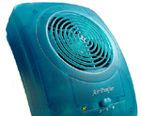Ionic air purifier is a device that is able to eliminate various types of airborne particles and pollutants from the air through dispersing negatively (and/or positively) charged ions or ozone. According to what type of substance is dispersed through an ionic air purifier, there are two types of air ionizers: negative ion generators and ozone generators. The first type of air purifiers disperse negatively charged ions into the air. These negatively charged ions occur naturally by waterfalls or after thunderstorms and have an ability of cleaning the air from various pollutants. Generated by ionic air purifiers , negatively charged ions can then be attracted by positively charged airborne particles, such as dust and mold. These airborne particles can then attach to the nearby surfaces, such as walls or furniture, leaving the air cleaner.
Ionic air purifier
 The simplest types of air ionizers use static charges to eliminate pollutants from the indoor air. The airborne particles attached to negatively charged ions then deposit on the walls, floors, curtains and other surfaces in the area. The disadvantage of such air cleaners is that they cannot remove the deposits of pollutants from any surfaces. More complicated units are constructed in order to prevent the deposition of pollutants to surfaces. They also release negatively charged ions causing airborne particles become charged. These particles are then collected in a cleaner on an electrostatic charged panel filter. In other ionizers, negatively charged particles are passively moved back to the ionizer, which has a positively charged sleeve or cover. There are two types, a one-stage or a two-stage, design for airborne particle collection. A two-stage design is more complicated, more efficient and, hence, more expensive, while a single-stage design is less effective since a charged medium is used both to charge and collect airborne pollutants.
The simplest types of air ionizers use static charges to eliminate pollutants from the indoor air. The airborne particles attached to negatively charged ions then deposit on the walls, floors, curtains and other surfaces in the area. The disadvantage of such air cleaners is that they cannot remove the deposits of pollutants from any surfaces. More complicated units are constructed in order to prevent the deposition of pollutants to surfaces. They also release negatively charged ions causing airborne particles become charged. These particles are then collected in a cleaner on an electrostatic charged panel filter. In other ionizers, negatively charged particles are passively moved back to the ionizer, which has a positively charged sleeve or cover. There are two types, a one-stage or a two-stage, design for airborne particle collection. A two-stage design is more complicated, more efficient and, hence, more expensive, while a single-stage design is less effective since a charged medium is used both to charge and collect airborne pollutants.
Ionic air purifier features
The effectiveness depends on the size of the collecting plates, the flow rate and the strength of the electrical field. The particle collection efficiency is reduced due to a longer use, as the collecting plates become covered with the particles. There are a lot of advantages concerning ionic air purifiers . An ionized room offers many health benefits, therefore air ionizers are being chosen by people who suffer from allergies, asthma and other respiratory diseases, since ionic air purifiers are efficient in eliminating dust, pollen, mold, cigarette smoke, harmful bacteria and viruses from the air. In addition, in combination with ozone generators ionic air purifiers become even more effective as they can remove unpleasant odor. These devices are very cost effective due to their low energy costs because of low pressure drop. The precipitating cell is reusable and it only requires periodical cleaning that saves long-term filter replacement costs. However, as all devices, ionic air purifiers also have a few disadvantages. Although the airflow through the units remains the same with use, ionic air purifiers become less efficient with time. Collecting cells require frequent cleaning and can release ozone as a by-product. And when price is concerned, ionic air purifiers have a relatively high initial cost including expensive installation. Additionally, charged particles can discolor room walls, furnishings and other room surfaces.
Advantages of ionic air purifier
Despite all the disadvantages of ionic air purifiers and ozone generators, these devices are widely used for residential air purification. There are different modes of ionic air purifiers, such as room, home air purifiers. They are cost effective, portable, very easy to use, efficient in cleaning the air from various pollutants and odors, and requires easy maintenance. Although they are less effective than HEPA air filters but also are less expensive. Some manufacturers claim that the efficiency of ionic air purifiers equals to that of HEPA air filters, however, this is misleading. There are also some claims that there is a possibility to produce negative ions without actually producing ozone as a by-product but there are no evidence based data to prove such information. One should know that even though ionic air purifiers work well, they are of a limited use when very small particles are concerned, since they cannot remove very small particulates from the air. Recent experiments unfortunately show that ionic air purifiers even combined with ozone generators are less effective in removing dust, pollen, mold and tobacco smoke than any other air purifiers. Since there are so many controversy discussions and debates concerning ionic air purifiers, it is every consumer’s choice whether to use them or not.